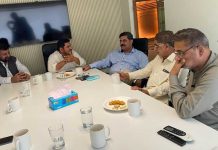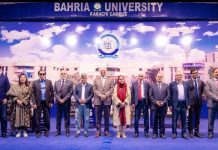KARACHI: A meeting was held on Thursday via video-link by the Advisor to Prime Minister for Commerce Abdul Razzak Dawood, with presidents of various chambers of commerce including Karachi, Lahore, Faisalabad and Gujranwala to discuss and elicit views of the stake holders regarding initiative of the Tariff Rationalization Board to review and reform the tariff structure of various industrial raw materials imported by various sectors and to rationalize the same in order to support the industrial sectors and stimulate growth, says a Press release.
KCCI was represented in the meeting by President Agha Shahab Ahmed Khan and Former Senior Vice President Ibrahim Kasumbi, to provide input and suggestions for tariff rationalization to the Advisor to PM for Commerce.
Briefing the participants of the meeting, Abdul Razzak Dawood said that the government is aiming to reduce and if necessary phase out Additional Customs Duty (ACD) and Regulatory Duty (RD) on those raw materials which are not produced in Pakistan. He said that Pakistan is among the very few countries where duties and taxes on imports are a major source of revenue and such heavy reliance on imports for revenue generation is counter-productive, particularly the tariffs on industrial raw materials.
Therefore the Tariff Rationalization Board in collaboration with National Tariff Commission is working on a plan to rationalize and phase out high tariffs on raw materials to support and encourage investment in industrialization and implement the changes in the budget for next fiscal year 2021-22. The purpose of today’s meeting was to involve the stake holders through trade bodies and chambers of commerce to identify the sectors and raw materials which are subject to excessive tariffs and where the rationalization and reduction is necessary to reduce cost of production and making the industries more competitive.
Abdul Razak Dawood, while agreeing to the suggestions of President Karachi Chamber of Commerce & Industry (KCCI) Agha Shahab Ahmed Khan, assured that the Ministry of Commerce was working on rationalizing of tariffs and duties in such a manner that these tariffs and duties safeguard the domestic industry rather than becoming a source of revenue generation.
Responding to Agha Shahab’s suggestions, Razak Dawood who is also the Chairman of National Tariff Policy Board, agreed that the representatives and experts from numerous other important sectors of the economy and specially the textile sector must also become part of these meetings which should not remain confined to Presidents of Chambers of Commerce only. “Initially, the ministry of commerce is analyzing tariffs and duties for textile sector which will be followed by tariff rationalization for other sectors as well in subsequent meetings which will be held in September and October”, he added.
Speaking on the occasion, President KCCI said that it was encouraging to see that the Ministry of Commerce is working to finalize tariff rationalization policy on industrial raw materials for the next three years which was long overdue and will ensure sustainability of economy. The planned reforms will allow businessmen and industrialists to focus on expanding their production and exports rather than remaining concerned with unpredictability of costs due to frequent changes in tariff structures and ad-hoc measures by the FBR.
He pointed out that since Pakistan came to existence, the governments from time to time have been pursuing tariff policies focused on revenue generation only which was not a wise move as the tariff structure should be devised to protect and safeguard the interest of domestic industry and enable them to efficiently compete with imported products.
He noted that it has been observed in many cases that duties on imported finished goods were lower while these were too high on the import of raw materials required by local manufacturers of same products that results in discouraging the local production as the locally manufactured finished goods become costlier and uncompetitive when compared to the imported ones which are available at cheaper rates.
“Duties on the imports of raw materials have to be drastically brought down in order to enable the local industries to efficiently compete with imported products which, if done, would surely improve production capacity, encourage industrial expansion, generate employment opportunities and prove favorable for the economy”, he added.
President KCCI further suggested that holding consultative meetings with Presidents of Chambers of Commerce & Industry was although a good move by the Ministry of Commerce but in order to make these meetings result oriented, experts from not just textile sector but other important sectors recommended by Chambers of Commerce must also be allowed to participate in such meetings whose valuable inputs would make such meetings successful and result oriented.
While assuring KCCI’s full support and cooperation, President KCCI said that the business and industrial community appreciates the initiatives taken by the MOC and NTPB to create an enabling environment and provide its feedback and proposals on specific sectors which are in need of relief through reduction in tariffs on their inputs and raw materials.
KCCI gives input & suggestions for tariff realisation
Sign in
Welcome! Log into your account
Forgot your password? Get help
Password recovery
Recover your password
A password will be e-mailed to you.




